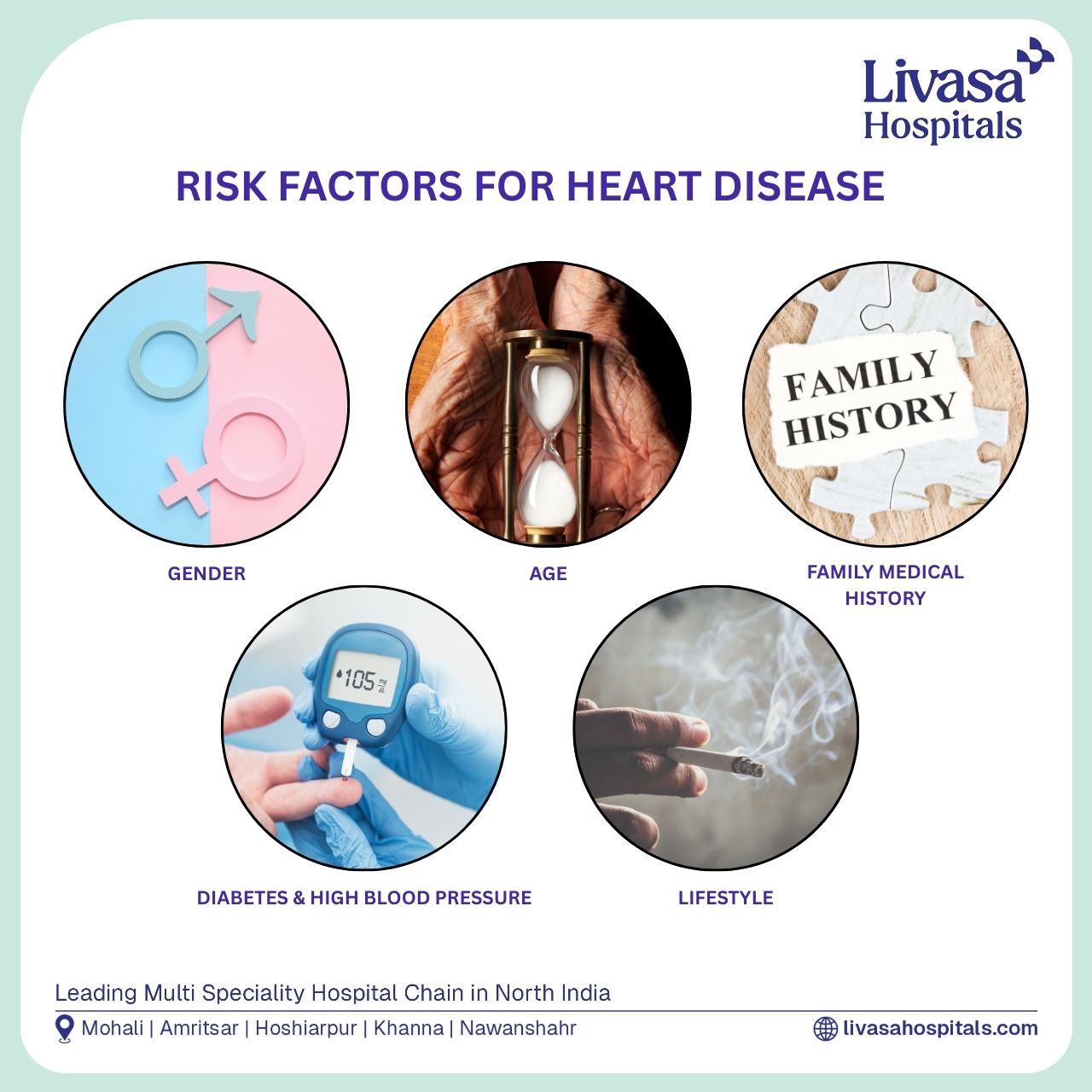19 Dec 2025
Age Specific Related to Psoriasis in Amritsar


Dr. Harinder K Bali
30 Jan 2025
Call +91 80788 80788 to request an appointment.
Heart disease is a common health issue worldwide, affecting millions every year. A group of medical diseases that affect the heart, obstructing its optimal functioning are called heart diseases. These diseases, with the help of medicinal administration and specific procedures paired with optimised lifestyle changes, can be effectively managed and cured. We at Livasa Hospital in Mohali recognise the value of promoting heart health awareness. Being the best Cardiologist Hospital in Mohali, we are committed to helping you understand, prevent, and manage heart diseases effectively.
We believe that in order to make an educated and prompt decision, you must know all related information. In this article, we will understand their types and other related information.
Common Types of Heart Disease
There are many different types of heart diseases, and these can be broadly categorised into the following:
Recognising the Warning Signs of Heart Disease
Since heart disease can be silent, you need to pay attention to any warning signs. Angina, or chest pain, is a common symptom, but heart disease can show up in other ways too:
It's important to note that heart disease symptoms might manifest differently in each gender. Women may experience unusual fatigue, mild nausea, and vague discomfort, which might not immediately be linked to heart problems. This variation in presentation underscores the importance of early diagnosis and prompt medical intervention.
Risk Factors for Heart Disease
Some of the primary reasons which are responsible for heart disease in a person are given below:

Why Are Heart Health Checkups Crucial?
In India, heart disease is a prevalent medical problem. Although most people associate the condition with ageing, early identification is necessary for effective prevention and therapy. Regular cardiac checkups enable your doctor to evaluate your risk factors and identify possible problems before they become serious. In many cardiac problems, symptoms don't appear for a long time. Early intervention with medication or lifestyle changes can prevent major consequences.
You need to get regularly screened if you are above 40 or have heart disease risk factors. Consult with your doctor at the Cardiology Hospital in Mohali to ask about the frequency of screening. Investing in heart health now will have a big impact on long-term well-being.
Preventing Heart Disease
Despite the fact that heart disease is a serious health concern, it is generally preventable. You may significantly reduce your chance of experiencing a heart attack or stroke by leading a heart-healthy lifestyle.
Choose Livasa Hospital for Your Heart Care
The heart care program at Livasa Hospital delivers complete cardiovascular treatment with excellent patient support. Our team of the best heart doctors in Mohali uses advanced medical methods to achieve superior outcomes of treatments.
If you need help with the symptoms of heart disease and would like to better understand your heart's health, schedule an appointment at the best Cardiologist Hospital in Mohali with one of our heart specialists.
FAQs
Q1. Can we fully eliminate or cure heart disease?
Some heart diseases can be treated and even reversed with lifestyle modifications and medication under the supervision of top heart doctors, while sometimes a complete cure may not always be possible. Therefore, it is always advised to consult the experienced cardiologists at Livasa Hospitals to discuss the safest and most promising treatment plans.
Q2. What makes Livasa Hospitals different from other hospitals in Cardiology medicine?
Livasa Heart Hospital Mohali prides itself on having a heart centre with state-of-the-art equipment and some of the most experienced cardiologists in the field. Our approach provides the highest quality of medical care to all patients with heart disease.
Q3. What types of treatments are offered in the Cardiology Department?
The Cardiology Department handles heart conditions through medical treatments combined with minimally invasive methods and surgical procedures like bypass surgery.
+91 80788 80788
Livasa Healthcare Group Corporate Office,Phase-8, Industrial Area, Sector 73, Sahibzada Ajit Singh Nagar, Punjab 160071
livasacare@livasahospitals.in
| Mohali | +91-99888 23456 |
| Amritsar | +91-99887 49494 |
| Hoshiarpur | +91-99883 35353 |
| Nawanshahr | +91-75081 82337 |
| Khanna | +91-98888 05394 |